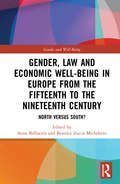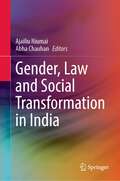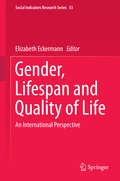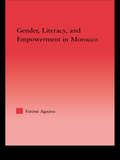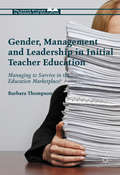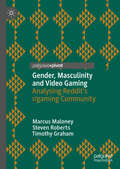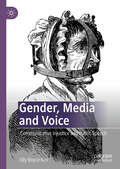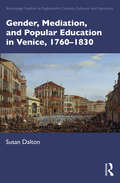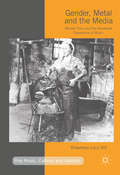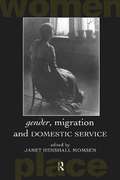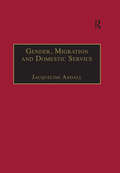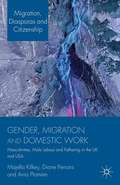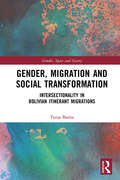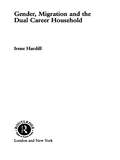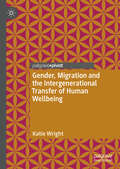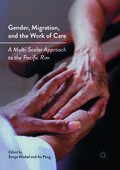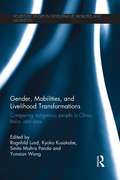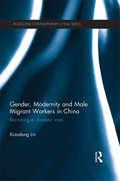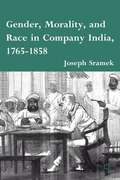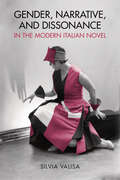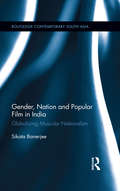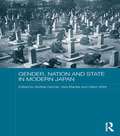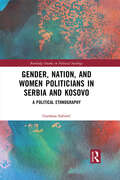- Table View
- List View
Gender, Law and Economic Well-Being in Europe from the Fifteenth to the Nineteenth Century: North versus South? (Gender and Well-Being)
by Anna Bellavitis Beatrice Zucca MichelettoThis book offers a comparative perspective on Northern and Southern European laws and customs concerning women’s property and economic rights. By focusing on both Northern and Southern European societies, these studies analyse the consequences of different juridical frameworks and norms on the development of the economic roles of men and women. This volume is divided into three parts. The first, Laws, presents general outlines related to some European regions; the second, Family strategies or marital economies?, questions the potential conflict between the economic interests of the married couple and those of the lineage within the nobility; finally, the third part of the book, Inside the urban economy, focuses on economic and work activities of middle and lower classes in the urban environment. The assorted and rich panorama offered by the history of the legislation on women’s economic rights shows that similarities and differences run through Europe in such a way that the North/South model looks very stereotyped. While this approach calls into question classical geographical and cultural maps and well-established chronologies, it encourages a reconsideration of European history according to a cross-boundaries perspective. By drawing on a wide range of social, economic and cultural European contexts, from the late medieval to early modern age to the nineteenth century, and including the middle and lower classes (especially artisans, merchants and traders) as well as the economic practices and norms of the upper middle class and aristocracy, this book will be of interest to economic and social historians, sociologists of health, gender and sexuality, and economists.
Gender, Law and Social Transformation in India
by Abha Chauhan Ajailiu NiumaiThis book provides deep insights into the wide-ranging issues linked to gender, law, and social transformation in India. It focuses on women-centered laws as well as the violence of unequal and discriminatory social order. It emphasizes violence and the neutrality of laws that sustain the status quo and perpetuate the stereotypical notions related to women’s condition. Based on the first-hand experience of laws and their nuanced understanding, the essays highlight the rules associated with the private and the public domains. The chapters in the volume analyze various statutes and their enactment related to domestic violence, dowry crimes, sexual abuse at home as well as sexual harassment at the workplace, child marriages, education, property rights, trafficking, prostitution, ‘honor’ killings, and armed conflict. The book is essential to the academics and researchers in the disciplines of social sciences, gender studies, law, and the government and policy-makers for making meaningful interventions.
Gender, Lifespan and Quality of Life
by Elizabeth EckermannThis publication addresses the gender dimensions of people's lived experience and emphasizes how gender relationships differentially impact on women's and girls' as well as men's and boys' subjective well-being across the lifespan. It therefore fills a significant gap in the literature on quality of life and subjective well-being. The book brings together research which compares female's and male's subjective experiences of well-being at various life stages from a variety of countries and regions, particularly focusing on women's subjective well-being. Sex-disaggregation of data on objective conditions of quality of life is now routinely undertaken in many countries of the world. However, despite the burgeoning of objective data on sex differences in life conditions across the world, very little gender analysis is carried out to explain fully such difference and there is still a serious dearth of data on gender differences in subjective experiences of quality of life and well-being. This publication will assist researchers, teachers, service providers and policy makers in filling some of the gaps in currently available literature on the nexus between age and gender in producing differential experiences of subjective wellbeing.
Gender, Literacy, and Empowerment in Morocco (Middle East Studies: History, Politics & Law)
by Fatima AgnaouThis book's concept concerns the positive correlation between literacy and women's development and empowerment in developing countries.
Gender, Management and Leadership in Initial Teacher Education: Managing to Survive in the Education Marketplace? (Palgrave Studies in Gender and Education)
by Barbara ThompsonThis book highlights the difficulties that women working as managers and leaders in initial teacher education face. Teacher education is at the forefront of education reforms and yet little is known about the professional lives of those who work within it. Whereas many women are moving into positions of authority in teacher training, some existing women managers are being marginalized within new internally differentiated layers of managerial structures. Yet other female managers, mainly new appointees, seem to endorse the discourses associated with new managerialist practices. Simultaneously some women who manage in teacher training are engaged in a struggle for survival individually and professionally. In the main, men seem to be missing from authority positions and will conclude that, in the current climate, the management of teacher training is ‘no job for a man’.
Gender, Manumission, and the Roman Freedwoman
by Matthew J. PerryGender, Manumission, and the Roman Freedwoman examines the distinct problem posed by the manumission of female slaves in ancient Rome. The sexual identities of a female slave and a female citizen were fundamentally incompatible, as the former was principally defined by her sexual availability and the latter by her sexual integrity. Accordingly, those evaluating the manumission process needed to reconcile a woman's experiences as a slave with the expectations and moral rigor required of the female citizen. The figure of the freedwoman-fictionalized and real-provides an extraordinary lens into the matter of how Romans understood, debated, and experienced the sheer magnitude of the transition from slave to citizen, the various social factors that impinged upon this process, and the community stakes in the institution of manumission.
Gender, Masculinity and Video Gaming: Analysing Reddit's r/gaming Community
by Steven Roberts Marcus Maloney Timothy GrahamThis book examines gender attitudes in Reddit’s popular video gaming community subreddit, r/gaming. Video gaming has long been understood as a masculinised social space and, while increasing numbers of girls and women now engage in the pastime, boys and men remain the predominant social actors. Furthermore, the gaming community has been widely identified as a prime case study in broader concerns around ‘toxic’ masculinity and gendered online harassment. However, there is also underexamined evidence of a growing movement in the community coming forward to voice its collective opposition. Utilising an innovative combination of computational and qualitative methods, the research undertaken here exposes this fuller picture, revealing significant contestation and a spectrum of attitudes that mark out this popular gaming community as a battleground for gender (in)equality. Students and scholars across a range of disciplines, including gender studies, media studies, cultural studies, sociology, games studies and computer sciences, will find this book of interest.
Gender, Media and Voice: Communicative Injustice and Public Speech
by Jilly Boyce KayThis book explores the increasing imperatives to speak up, to speak out, and to ‘find one’s voice’ in contemporary media culture. It considers how, for women in particular, this seems to constitute a radical break with the historical idealization of silence and demureness. However, the author argues that there is a growing and pernicious gap between the seductive promise of voice, and voice as it actually exists. While brutal instruments such as the ducking stool and scold’s bridle are no longer in use to punish women’s speech, Kay proposes that communicative injustice now operates in much more insidious ways. The wide-ranging chapters explore the mediated ‘voices’ of women such as Monica Lewinsky, Hannah Gadsby, Diane Abbott, and Yassmin Abdel-Magied, as well as the problems and possibilities of gossip, nagging, and the ‘traumatised voice’ in television talk shows. It critiques the optimistic claims about the ‘unleashing’ of women’s voices post-#MeToo and examines the ways that women’s speech continues to be trivialized and devalued. Communicative justice, the author argues, is not about empowering individuals to ‘find their voice’, but about collectively transforming the whole communicative terrain.
Gender, Mediation, and Popular Education in Venice, 1760–1830 (Routledge Studies in Eighteenth-Century Cultures and Societies)
by Susan DaltonGender, Mediation, and Popular Education in Venice, 1760–1830 examines how women with enough cultural capital could turn their identity as representatives of "the public" – those on the receiving end of education – to their advantage, producing knowledge under the guise of relaying it. Author Susan Dalton looks at the question of how elite women turned their reputation for ignorance into an opportunity to establish themselves as authors at the dawn of the nineteenth century in Venice. Many literary figures saw women as a group in need of education. By deploying essentialist understandings of femininity, whereby women possessed superior moral virtue but deficient rationality, these women entered the world of print as cultural mediators, identified by contemporaries as key players in the social projects of public education and moral edification central to the European Enlightenment. Focussing on Isabella Teotochi Albrizzi and Giustina Renier Michiel, both renowned Venetian authors, Dalton introduces two well-known Italian women of letters to English-speaking scholars, re-evaluates the impact of their writing in Italy and raises questions about female authorship across Europe, broadens our conceptions of gender norms, and enriches our knowledge of a little-known period of women’s writing in Italy. This volume is an essential resource for students and scholars alike interested in women’s and gender history, early modern history and social and cultural history.
Gender, Metal and the Media: Women Fans and the Gendered Experience of Music (Pop Music, Culture and Identity)
by Rosemary Lucy HillThis book is a timely examination of the tension between being a rock music fan and being a woman. From the media representation of women rock fans as groupies to the widely held belief that hard rock and metal is masculine music, being a music fan is an experience shaped by gender. <P><P>Through a lively discussion of the idealised imaginary community created in the media and interviews with women fans in the UK, Rosemary Lucy Hill grapples with the controversial topics of groupies, sexism and male dominance in metal. She challenges the claim that the genre is inherently masculine, arguing that musical pleasure is much more sophisticated than simplistic enjoyments of aggression, violence and virtuosity. <P>Listening to women’s experiences, she maintains, enables new thinking about hard rock and metal music, and about what it is like to be a women fan in a sexist environment.
Gender, Metal and the Media: Women Fans and the Gendered Experience of Music (Pop Music, Culture and Identity)
by Rosemary Lucy HillThis book is a timely examination of the tension between being a rock music fan and being a woman. From the media representation of women rock fans as groupies to the widely held belief that hard rock and metal is masculine music, being a music fan is an experience shaped by gender. Through a lively discussion of the idealised imaginary community created in the media and interviews with women fans in the UK, Rosemary Lucy Hill grapples with the controversial topics of groupies, sexism and male dominance in metal. She challenges the claim that the genre is inherently masculine, arguing that musical pleasure is much more sophisticated than simplistic enjoyments of aggression, violence and virtuosity. Listening to women’s experiences, she maintains, enables new thinking about hard rock and metal music, and about what it is like to be a women fan in a sexist environment.
Gender, Migration and Domestic Service (Routledge International Studies of Women and Place)
by Janet Henshall MomsenThis book examines a wide range of migration patterns which have arisen, and exposes the tensions and difficulties including: * legal and empowerment issues * cultural and language diversities and barriers * the impact of live-in employment. The book features case studies taken from Europe, South and North America, the Caribbean, Asia, and Africa and uses original fieldwork using quantitative and qualitative methods.
Gender, Migration and Domestic Service: The Politics of Black Women in Italy (Interdisciplinary Research Series in Ethnic, Gender and Class Relations)
by Jacqueline AndallThe book examines the experiences of Black women in Italy from the 1970s to the 1990s. Although Italy is still perceived as a recent immigration country, the book demonstrates how Black women were among the first groups of new migrants to the country. Black women migrating to Italy were employed almost exclusively as live-in domestic workers and detailed attention is paid to the history and political organization of this sector. Unlike much published work in Italian, this book adopts an integrated form of analysis where gender, ethnicity and class are seen to be interconnected constructs. The book also situates Black women within the framework of the national constituency of gender. This approach challenges the ideology surrounding the Italian family and demonstrates that while live-in domestic work created specific forms of social marginality for Black women, it paradoxically allowed Italian women to express their new social identities within and outside the family. The book concludes that Italian women have largely failed in their attempts to transform the division of labour within the home and that the decision to employ other (migrant) women to fulfill household tasks is a trend which sits uneasily within the framework of an inclusive feminist project for women.
Gender, Migration and Domestic Work
by Pierrette Hondagneu-Sotelo Ania Plomien Majella Kilkey Diane Perrons Hernan RamirezBased on studies conducted in the UK and USA, this book investigates the experiences of suppliers and consumers of masculinized domestic services, exploring issues such as increasing inequality, migration, the rise of commoditized domestic services, contemporary masculinities and the gendering of paid work.
Gender, Migration and Social Transformation: Intersectionality in Bolivian Itinerant Migrations (Gender, Space and Society)
by Tanja BastiaIntersectionality can be used to analyse whether migration leads to changes in gender relations. This book finds out how migrants from a peri-urban neighbourhood on the outskirts of Cochabamba, Bolivia, make sense of the migration journeys they have undertaken. Migration is intrinsically related to social transformation. Through life stories and community surveys, the author explores how gender, class, and ethnicity intersect in people’s attempts to make the most of the opportunities presented to them in distant labour markets. While aiming to improve their economic and material conditions, migrants have created a new transnational community that has undergone significant changes in the ways in which gender relations are organised. Women went from being mainly housewives to taking on the role of the family’s breadwinner in a matter of just one decade. This book asks and addresses important questions such as: what does this mean for gender equality and women’s empowerment? Can we talk of migration being emancipatory? Does intersectionality shed light in the analysis of everyday social transformations in contexts of transnational migrations? This book will be useful to researchers and students of human geography, development studies and Latin America area studies.
Gender, Migration and the Dual Career Household (Routledge International Studies of Women and Place #Vol. 4)
by Irene HardillThis book explores the gender issues associated with international migration in dual career households. Adopting a feminist approach, the author links research in economics, sociology, management and business and human geography to explore post-industrial managerial and professional careers. Particular emphasis is placed on the way in which social mobility and spatial mobility are entwined. The author explores the location and mobility decisions of dual career households, examining their personal and household biographies as well as published statistics. Of essential interest to scholars of human geography, sociology and gender studies, this book will also interest those working in organizational, migration and urban studies.
Gender, Migration and the Intergenerational Transfer of Human Wellbeing
by Katie WrightThis book discusses how human wellbeing is constructed and transferred intergenerationally in the context of international migration. Research on intergenerational transmission (IGT) has tended to focus on material asset transfers prompting calls to balance material asset analysis with that of psychosocial assets – including norms, values attitudes and behaviors. Drawing on empirical research undertaken with Latin American migrants in London, Katie Wright sets out to redress the balance by examining how far psychosocial transfers may be used as a buffer to mediate the material deprivations that migrants face via adoption of a gender, life course and human wellbeing perspective.
Gender, Migration, and the Work of Care
by Sonya Michel Ito PengThis book explores how around the world, women's increased presence in the labor force has reorganized the division of labor in households, affecting different regions depending on their cultures, economies, and politics; as well as the nature and size of their welfare states and the gendering of employment opportunities. As one result, the authors find, women are increasingly migrating from the global south to become care workers in the global north. This volume focuses on changing patterns of family and gender relations, migration, and care work in the countries surrounding the Pacific Rim--a global epicenter of transnational care migration. Using a multi-scalar approach that addresses micro, meso, and macro levels, chapters examine three domains: care provisioning, the supply of and demand for care work, and the shaping and framing of care. The analysis reveals that multiple forms of global inequalities are now playing out in the most intimate of spaces.
Gender, Mobilities, and Livelihood Transformations: Comparing Indigenous People in China, India, and Laos (Routledge Studies in Development, Mobilities and Migration)
by Kyoko Kusakabe Ragnhild Lund Smita Mishra Panda Yunxian WangIn the era of globalization many minority populations are subject to marginalization and expulsion from their traditional habitats due to rapid economic restructuring and changing politico-spatial relations. This book presents an analytical framework for understanding how mobility is an inherent part of such changes. The book demonstrates how current neoliberal policies are making people increasingly on the move – whether voluntarily or forced, and whether individually, as family, or as whole communities – and how such mobility is changing the livelihoods of indigenous people, with particular focus on how these transformations are gendered. It queries how state policies and cross-border and cross-regional connections have shaped and redefined the livelihood patterns, rights and citizenship, identities, and gender relations of indigenous peoples. It also identifies the dynamic changes that indigenous men and women are facing, given rapid infrastructure improvements and commercialization and/or industrialization in their places of Environment. With a focus on mobility, this innovative book gives students and researchers in development studies, gender studies, human geography, anthropology and Asian studies a more realistic assessment of peoples livelihood choices under a time of rapid transformation, and the knowledge produced may add value to present development policies and practices.
Gender, Modernity and Male Migrant Workers in China: Becoming a 'Modern' Man (Routledge Contemporary China Series)
by Xiaodong LinRural-urban migration within China has transformed and reshaped rural people’s lives during the past few decades, and has been one of the most visible phenomena of the economic reforms enacted since the late 1970s. Whilst Feminist scholars have addressed rural women’s experience of struggle and empowerment in urban China, in contrast, research on rural men’s experience of migration is a neglected area of study. In response, this book seeks to address the absence of male migrant workers as a gendered category within the current literature on rural-urban migration. Examining Chinese male migrant workers’ identity formation, this book explores their experience of rural-urban migration and their status as an emerging sector of a dislocated urban working class. It seeks to understand issues of gender and class through the rural migrant men’s narratives within the context of China’s modernization, and provides an in-depth analysis of how these men make sense of their new lives in the rapidly modernizing, post-Mao China with its emphasis on progress and development. Further, this book uses the men’s own narratives to challenge the elite assumption that rural men’s low status is a result of their failure to adopt a modern urban identity and lifestyle. Drawing on interviews with 28 male rural migrants, Xiaodong Lin unpacks the gender politics of Chinese men and masculinities, and in turn contributes to a greater understanding of global masculinities in an international context. This book will be of great interest to students and scholars working in the fields of Chinese culture and society, gender studies, migration studies, sociology and social anthropology. Shortlisted for this year's BSA Philip Abrams Memorial Prize.
Gender, Morality, and Race in Company India, 1765-1858
by Joseph SramekBetween 1765 and 1858, British imperialists in India obsessed continuously about gaining and preserving Indian "opinion" of British moral and racial prestige. Weaving political, intellectual, cultural, and gender history together in an innovative approach, "Gender, Morality, and Race in Company India, 1765-1858" examines imperial anxieties regarding British moral misconduct in India ranging from debt and gift giving to drunkenness and irreligion and points out their wider relationship to the structuring of British colonialism. Showing a pervasive fear among imperial elites of losing "mastery" over India, as well as a deep distrust of Indian civil and military subordinates through whom they ruled, Sramek demonstrates how much of the British Raj's notable racial arrogance after 1858 can in fact be traced back into the preceding Company period of colonial rule. Rather than the Sepoy Rebellion of 1857 ushering in a more racist form of colonialism, this book powerfully suggests far greater continuity between the two periods of colonial rule than scholars have hitherto generally recognized. "
Gender, Narrative, and Dissonance in the Modern Italian Novel
by Silvia ValisaCombining close textual readings with a broad theoretical perspective, Gender, Narrative, and Dissonance in the Modern Italian Novel is a study of the ways in which gender shapes the principal characters and narratives of seven important Italian novels of the nineteenth and twentieth centuries, from Alessandro Manzoni's I promessi sposi (1827) to Elsa Morante's Aracoeli (1982).Silvia Valisa's innovative approach focuses on the tensions between the characters and the gender ideologies that surround them, and the ways in which this dissonance exposes the ideological and epistemological structures of the modern novel. A provocative account of the intersection between gender, narrative, and epistemology that draws on the work of Georg Lukács, Barbara Spackman, and Teresa de Lauretis, this volume offers an intriguing new approach to investigating the nature of fiction.
Gender, Nation and Popular Film in India: Globalizing Muscular Nationalism (Routledge Contemporary South Asia Series)
by Sikata BanerjeeInterpretations of manhood have unfolded in India within a middle class cultural milieu shaped by an assertive self-confidence fuelled by liberalisation, a process by which India has been integrated into the global political economy and the prominence of Hindutva or Hindu nationalist politics. This book unpacks a particular gendered vision of nation in the modern Indian context by drawing on popular films. This muscular nationalism is an intersection of a specific vision of masculinity with the political doctrine of nationalism. The idea of nation is animated by an idea of manhood associated with martial prowess, muscular strength and toughness, but coupled with the image and construct of virtuous woman – a gendered binary of martial man and chaste woman. The author skilfully and convincingly draws together issues of political economy, including globalization and neoliberalism with majoritarian politics and popular culture, thus showing how disparate strands intersect and build on each other. Using interpretive methodologies and popular media, the book presents new interpretations of Bollywood films through the lenses of gender, masculinity and nationalism. It will be of interest to scholars of South Asian politics and culture, in particular Indian nationalism, popular culture, media and gender studies.
Gender, Nation and State in Modern Japan (ASAA Women in Asia Series)
by Andrea Germer, Vera Mackie and Ulrike WöhrGender, Nation and State in Modern Japan makes a unique contribution to the international literature on the formation of modern nation–states in its focus on the gendering of the modern Japanese nation-state from the late nineteenth century to the present. References to gender relations are deeply embedded in the historical concepts of nation and nationalism, and in the related symbols, metaphors and arguments. Moreover, the development of the binary opposition between masculinity and femininity and the development of the modern nation-state are processes which occurred simultaneously. They were the product of a shift from a stratified, hereditary class society to a functionally-differentiated social body. This volume includes the work of an international group of scholars from Japan, the United States, Australia and Germany, which in many cases appears in English for the first time. It provides an interdisciplinary perspective on the formation of the modern Japanese nation–state, including comparative perspectives from research on the formation of the modern nation–state in Europe, thus bringing research on Japan into a transnational dialogue. This volume will be of interest in the fields of modern Japanese history, gender studies, political science and comparative studies of nationalism.
Gender, Nation and Women Politicians in Serbia and Kosovo: A Political Ethnography (Routledge Studies in Political Sociology)
by Gordana SubotićThis book examines the ways women politicians in Serbia and Kosovo have imagined, constructed, and politicised national identity and gender while engaging with politics in the context of the democratisation process. The first book to focus on the work of women inside political structures, it draws on participant observation and interview material to answer the question of how women in positions of power and influence deal with their national identity and gender in societies deeply divided along ethnic lines. Based on close studies of the work of a small number of women from different ethnic backgrounds, the author offers comparative analyses of the ways in which women politicians of different ethnicities respond to similar events in their everyday work. An original political ethnography that considers engagement of women in formal politics, this volume will appeal to scholars across the social sciences with interests in political structures and political participation, particularly as these relate to questions of gender, nation and ethnicity.
